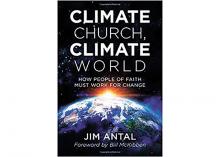The August sky was an eerie brownish-orange as the morning news warned Edmontonians not to exert themselves outside. Thick smoke smelling of charred forests blanketed the city, and the air quality was so poor that even healthy young people stayed indoors. On a family vacation, we drove through heavy smoke in southern British Columbia, never able to see the mountains, as the province experienced a second year of record-breaking forest fires.
It was a fitting time to read Climate Church, Climate World. Jim Antal’s book offers a well-written and well-supported encouragement for individual and communal engagement with the issue of climate change in ways that could lead to positive change. Many of the practical frustrations I hear in Alberta are raised clearly and helpfully in its pages.
One of these—the argument that our necessary use of fuel renders protesting the oil industry hypocritical—is gently and effectively addressed. Quoting an example of how slave owners were not suddenly hypocrites when they joined the abolition movement, Antal points out that “people enmeshed in a flawed system are not exempt from the struggle to transform that system.” He encourages confession of complicity along with active engagement of the theological, social, economic and spiritual work that spurs transformation.
That the needed transformation feels overwhelming, is another common excuse for inaction I hear among Christians. Antal, however, argues that faith communities have a moral imperative to repurpose themselves for this transformation, because it is so important that it cannot be ignored. Instead of being relegated to just another optional ideology or issue for congregations, he suggests that climate change is the “umbrella issue” under which all others fit.
“If the work of the church is to make God’s love and justice real, and since climate change amplifies every other social justice issue, it falls to the church to create the conditions in which people can face the reality of climate change and respond to God’s call to take action to protect God’s gift of creation,” he writes.
He makes a strong case for preachers and churches to engage hopefully and consistently in the issues of climate change in every aspect of church life and work: “We need to accept that we are not called to be a church for ourselves. We are called to be a church for others.”
This umbrella perspective is helpful. When I consider even a few of the issues my home church, and others like it, have faced in the last number of years—“greening” our buildings, charitable relief work, responding to disasters, the Truth and Reconciliation Commission and our response to it, and learning to communicate across differing opinions—it is quite clear how these can all fit under the umbrella.
“A repurposed church that explicitly values continuity of creation could declare our moral interdependence with our billions of neighbours the world over, as well as our countless yet-to-be-born neighbours,” he writes.
What I appreciate most about Climate Church, Climate World is the practicality of Antal’s reasoning and the insistent conviction that the church is a meaningful agent of change. His practical suggestions face the uncomfortable issues of climate change head on, dismantling apathy without inflicting unnecessary guilt.
While I am energized by his belief in the voice of the church and the examples of how this voice is crucial to social change, a needed critique of the church is missing: the rise of populist religion and an oft-repeated history of being resistant to needed social changes. While the church is a catalyst for change, it can also be a formidable obstacle to it, rationalizing and interpreting the Bible to meet its own desires.
Originally published in a longer format in Anabaptist Witness, Vol. 5 No. 2 (October 2018).




Add new comment
Canadian Mennonite invites comments and encourages constructive discussion about our content. Actual full names (first and last) are required. Comments are moderated and may be edited. They will not appear online until approved and will be posted during business hours. Some comments may be reproduced in print.